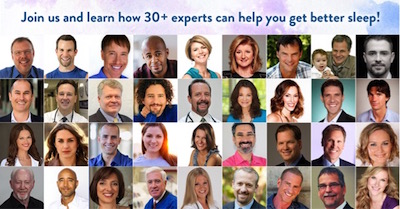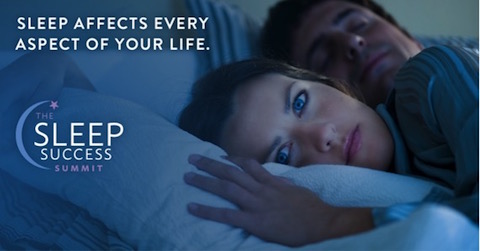As you probably know, insomnia is often a big issue if you have anxiety and/or depression. I like to address low serotonin, low GABA and low blood sugar for the sleep and mood issues but sleep issues can be caused by so many factors.
The Sleep Success summit addresses so many of these other factors: the adrenals, the thyroid, the gut, hormone health (all of which can impact sleep), plus topics on sleep apnea (and the inflammation connection), MTHFR, autoimmunity, using essential oils, sleep problems we see in kids and so much more.

Dr. Michael Breus is the host of the summit and is interviewed by Sean Croxton: “An Interview with The Sleep Doctor.” He shares:
We know that when people aren’t able to stay asleep or fall asleep there is always some type of a mental component, either anxiety or depression (60-70% of the time)
There are just not a lot of people out there treating insomnia other than just prescribing pills and I’m not a big fan of that. Now you have two problems – you have a sleep problem and you have a pill problem.
I learned something new listening to Dr. Breus’ interview. He uses an evidence-based technique called “sleep restriction” to help his patients with insomnia. He says it trains your brain to know when to sleep and it works for about 50% of his patients. When the “sleep restriction” technique isn’t enough he uses cognitive behavior therapy to help with the negative thoughts and worry around the lack of sleep and supplements. He does use medications short-term (a few weeks only) to break the insomnia cycle.
I’m so intrigued by this “sleep restriction” method that I went looking for the research and found this study published just last month: 70% of the women receiving cognitive behavioral therapy for insomnia (CBT-I) said they had no more insomnia after 8 weeks and 84% said they had no more insomnia after 24 weeks!
A randomized clinical trial was conducted among 106 perimenopausal or postmenopausal women aged 40 to 65 years with moderate insomnia symptoms and 2 or more daily hot flashes.
Telephone-based cognitive behavioral therapy for insomnia (CBT-I) – which included sleep restriction, stimulus control, sleep hygiene education, cognitive restructuring, and behavioral homework – was compared to menopause education MEC/ information about menopause and women’s health.
At 8 and 24 weeks, 33 of 47 women (70%) and 37 of 44 (84%) in the CBT-I group, had scores in the no-insomnia range, compared with 10 of 41 (24%) and 16 of 37 (43%) in the MEC group.
Dr. Breus’ expertise is CBT-I and he is new to the naturopathic and nutritional world so we do have some professional differences of opinion, like buying Cosco magnesium (I would suggest looking for a quality product just like I do with all supplments) and avoiding 5-HTP and melatonin (although I do agree we do need to be informed consumers when using them). The good news is that because he’s new to this he does ask great in-depth questions of the experts on the summit.
Other great interviews to check out:
- Ben Lynch, ND – Are Your Genes Affecting Your Ability to Sleep?
- Izabella Wentz, PharmD, FASCP – Getting to the Root Cause of Hypersomnia and Thyroid Fatigue
- Magdalena Wszelaki, HHC – Your Hormones Could Be Affecting Your Sleep
- Alan Christianson, NMD – Heal Your Adrenals and Get Better Sleep
- Daniel Kalish, DC – How Sleep Influences Functional Medicine
- Amy Myers, MD – Sleep, Functional Medicine and Autoimmune Function
- Eric L. Zielinski, DC, MPH(c), BA – Sleep and Essential Oils: What’s the Connection?
- Emily Fletcher – How Meditation Cured my Insomnia!
- David Wolfe – How Your Environment Could Be Affecting Sleep! (Earthing and grounding for better sleep + Analyzing your environment to sleep better)
You can REGISTER HERE
You can PURCHASE HERE (it’s summit special pricing until the summit ends)
I’d love to know if you’ve ever done cognitive behavioral therapy for insomnia (CBT-I) and if it helped you? Is yes did it include all of the following: sleep restriction, stimulus control, sleep hygiene education, cognitive restructuring, and behavioral homework? Please share in the comments.
